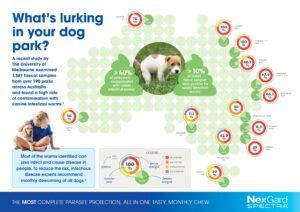Protecting your dog from intestinal worms and other parasites is an important part of preventive healthcare to keep your dog healthy and reduce the risk of health problems associated with parasite infestations.
Like any public place where dogs gather, Australian dog parks can potentially be contaminated with intestinal worms and other parasites such as fleas and ticks. A recent study by the University of Melbourne found that more than 40% of Australian dog parks were contaminated with canine intestinal worms. Dogs that visit dog parks can pick up parasites from other dogs, contaminated soil, or faecal matter left behind by other dogs.

How to protect your dog from intestinal worms
To reduce the risk of worm and parasite infestation, it is important to practice good hygiene and preventative measures. This includes the following:
- Regular deworming: It is important to regularly deworm your dog as part of their routine healthcare. Your veterinarian can recommend an appropriate deworming schedule based on your dog’s lifestyle and risk of exposure to worms.
- Practice good hygiene: Make sure to clean up after your dog and dispose of their faeces properly. Avoid areas where other dogs may have defecated, such as dog parks, and keep your dog away from any faeces they may encounter on walks.
- Prevent flea infestations: Fleas can transmit tapeworms to dogs, so it is important to keep your dog protected from fleas with flea preventative medication.
- Avoid raw meat: Feeding your dog raw meat can increase their risk of contracting intestinal worms. Make sure to feed your dog a balanced and nutritious diet of commercial dog food.
- Regular veterinary check-ups: Regular veterinary check-ups can help detect any signs of intestinal worms early on and ensure that your dog is healthy overall. Your veterinarian may recommend additional steps to help protect your dog from intestinal worms based on their specific needs.
Why regular deworming and parasite protection is important
Regular deworming is an important aspect of protecting dogs from intestinal worms. Deworming medications are typically given orally and work by killing the adult worms that are present in the dog’s intestine. The specific deworming schedule for your dog may vary depending on their age, lifestyle, and overall health.
and work by killing the adult worms that are present in the dog’s intestine. The specific deworming schedule for your dog may vary depending on their age, lifestyle, and overall health.
Puppies are particularly vulnerable to intestinal worms, as they can be passed on from their mother before birth or through her milk. Puppies should be dewormed every 2-3 weeks from the age of 2-8 weeks, and then every 3-6 months thereafter. Adult dogs should be dewormed at least once every 6-12 months, although the exact frequency may vary depending on their lifestyle and risk of exposure.
It is important to protect your dog from intestinal worms and parasites for several reasons:
- Health risks to your dog: Intestinal worms and parasites can cause a variety of health problems in dogs, ranging from mild to severe. Some common symptoms of a parasitic infection include diarrhea, vomiting, weight loss, and lethargy. In severe cases, parasites can cause anaemia, malnutrition, and even death.
- Risks to humans: Some intestinal worms and parasites that infect dogs can also be transmitted to humans. This is known as a zoonotic infection, and it can cause serious health problems in people, especially children and those with weakened immune systems.
- Impact on other pets and wildlife: Intestinal worms and parasites can also impact other pets and wildlife in the area. For example, if your dog has a flea infestation, it can spread to other animals in the vicinity. Similarly, if your dog has a tapeworm infection, the parasite can shed eggs in their faeces, which can contaminate the environment and infect other animals.
- Preventive healthcare: Protecting your dog from intestinal worms and parasites is an important part of preventive healthcare. Regular deworming and other preventative measures can help keep your dog healthy and reduce the risk of health problems associated with parasite infestations.
By protecting your dog from intestinal worms and parasites, you can help ensure that they lead a healthy, happy life. Regular veterinary check-ups and preventative care can help detect any signs of parasites early on and ensure that your dog receives the appropriate treatment.
How does medication protect dogs from intestinal worms and other parasites?
Deworming medication works by targeting and killing adult intestinal worms and other parasites in the dog’s digestive tract. The medication contains specific chemicals that interfere with the metabolism and neurological function of the parasites, leading to their death and eventual expulsion from the dog’s body.
Regular deworming can help prevent the build-up of intestinal parasites in your dog’s digestive tract and reduce the risk of health problems associated with parasite infestations.
The NexGard Range
To help make protecting your dog easy, Paddington Pups are now stocking the NexGard product range and we are currently running a promotion in collaboration with NexGard. With every 3 or 6 pack purchase of NexGard or NexGard SPECTRA, receive a FREE Wahu Chew’n Toss toy, valued at $19.95. This promotion will be available for a limited time only or while stocks last, so be sure to get in quick!

NexGard Chewables for dogs
NexGard is a chewable flea and tick medication for dogs that effectively protects against fleas, ticks and mites.
NexGard contains afoxolaner, an ingredient that kills fleas and ticks by disrupting their nervous system. It begins working within hours of administration and continues to kill fleas and ticks for a full month.
NexGard SPECTRA
NexGard Spectra chewables are a combination flea and tick preventative and deworming medication for dogs.
NexGard SPECTRA provides protection against multiple types of intestinal worms, including roundworms, hookworms, and whipworms. This can help reduce the risk of health problems associated with worm infestations, such as diarrhea, weight loss, and anemia.
In addition to deworming, NexGard SPECTRA provides effective protection against fleas and ticks, which can also transmit diseases and cause health problems in dogs.
The benefits of using NexGard and NexGard SPECTRA chewables for parasite and worm protection include:
- Convenience: the medication is given orally and are easy to administer to your dog. The medication is available in a flavoured chewable tablet that most dogs find palatable.
- Safe for most dogs: including puppies as young as 8 weeks old
- Can help prevent tick-borne diseases: Ticks can transmit a variety of diseases to dogs, so by preventing tick infestations you can reduce your dog’s risk of contracting these diseases.
- Can help prevent flea infestations: Fleas can cause discomfort and skin irritation for dogs, and they can also transmit tapeworms. By preventing flea infestations you can help keep your dog healthy and comfortable.
- Can be used with other medications: can be safely used with other medications, including heartworm preventatives, making it a convenient option for dogs with multiple health needs.
As with any medication, it is important to follow the recommended dosage and administration instructions and to consult with your veterinarian to determine if NexGard or NexGard SPECTRA is the right choice for your dog based on their individual needs and health history.